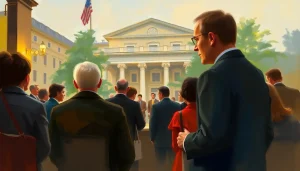From heated debates on civil rights to groundbreaking conversations with world leaders, America’s oldest public affairs forum has spent over a century shaping the national dialogue and transforming how we tackle society’s most pressing challenges. The Commonwealth Club of California, founded in 1903, has been a beacon of intellectual discourse and civic engagement for generations. This venerable institution has weathered the storms of societal change, technological revolutions, and shifting political landscapes, all while maintaining its core mission: to foster open discussion of important public issues.
A Legacy of Enlightenment and Engagement
The Commonwealth Club’s journey began in the early 20th century, a time of rapid industrialization and social upheaval. A group of forward-thinking San Franciscans, led by Edward F. Adams, envisioned a space where citizens could come together to discuss the issues of the day. Their goal was simple yet profound: to promote the public good by educating, enlightening, and empowering the community.
From its humble beginnings, the Club quickly grew into a powerhouse of public discourse. It attracted luminaries from all walks of life, from politicians and business leaders to artists and scientists. The Club’s podium became a coveted platform, graced by figures as diverse as Martin Luther King Jr., Ronald Reagan, and Bill Gates.
But the Commonwealth Club is more than just a stage for the famous. It’s a forum where everyday citizens can engage with ideas that shape their world. In an era of echo chambers and polarized debate, the Club stands as a testament to the power of open, respectful dialogue.
Programs That Provoke Thought and Inspire Action
The heart of the Commonwealth Club’s mission lies in its diverse array of programs and events. From intimate roundtable discussions to large-scale lectures, the Club offers something for every curious mind.
One of the Club’s most popular offerings is its speaker series. These events bring thought leaders from various fields to share their insights and engage with the audience. Imagine sitting in a room, listening to a Nobel laureate explain their groundbreaking research, or a renowned author discussing their latest work. These aren’t just lectures; they’re opportunities for real dialogue, where audience members can ask questions and challenge ideas.
But the Commonwealth Club isn’t content with just talking. It’s also a hub for action-oriented initiatives. Take, for example, its Climate One program. This groundbreaking series brings together leaders from business, government, and civil society to tackle the urgent issue of climate change. It’s not just about awareness; it’s about finding practical solutions to one of the most pressing challenges of our time.
The Club’s reach extends far beyond its physical walls. Through its radio program and podcast, “Commonwealth Club Radio,” it brings thought-provoking discussions to listeners across the nation. It’s like having a front-row seat to some of the most important conversations of our time, all from the comfort of your home or during your daily commute.
Shaping Policy, One Conversation at a Time
The Commonwealth Club’s influence on public policy is both subtle and profound. It doesn’t lobby or endorse candidates. Instead, it creates a space where ideas can be debated, refined, and ultimately, put into action.
Over the years, the Club has been at the forefront of numerous policy discussions. From early debates on women’s suffrage to contemporary discussions on artificial intelligence and its impact on society, the Club has consistently provided a platform for exploring the most pressing issues of the day.
One of the Club’s strengths is its ability to bring diverse voices to the table. It’s not uncommon to see a conservative politician sharing the stage with a liberal activist, each presenting their perspective on a contentious issue. This commitment to balanced dialogue helps break down ideological barriers and fosters a more nuanced understanding of complex issues.
The impact of these discussions ripples far beyond the Club’s walls. Policymakers, journalists, and community leaders often draw inspiration and insights from the conversations that take place at the Commonwealth Club. In this way, the Club acts as a kind of intellectual incubator, nurturing ideas that can shape the future of our society.
A Community of Curious Minds
At its core, the Commonwealth Club is more than just an organization; it’s a community. Membership in the Club opens doors to a world of intellectual stimulation and social connection. Whether you’re a seasoned professional or a young student just starting to explore the world of ideas, there’s a place for you at the Commonwealth Club.
Members enjoy exclusive access to events, networking opportunities, and a chance to engage directly with speakers and thought leaders. But perhaps the most valuable aspect of membership is the opportunity to connect with like-minded individuals who share a passion for learning and civic engagement.
The Club also recognizes the importance of nurturing the next generation of leaders and thinkers. Its youth programs provide students with opportunities to engage in meaningful discussions about the issues that will shape their future. From essay contests to leadership workshops, these initiatives are helping to create a more informed and engaged citizenry.
For those looking to take their involvement to the next level, the Club offers numerous volunteer opportunities. Whether it’s helping to organize events, conducting research, or serving on committees, volunteers play a crucial role in keeping the Club vibrant and dynamic.
Navigating the Digital Age
As the Commonwealth Club enters its second century, it faces new challenges and opportunities. The rise of digital media and virtual events has transformed the landscape of public discourse. But rather than seeing this as a threat, the Club has embraced these changes as a way to expand its reach and impact.
The COVID-19 pandemic accelerated this digital transformation. When in-person gatherings became impossible, the Club quickly pivoted to virtual events, allowing it to continue its mission of fostering public dialogue even in the face of unprecedented challenges. This adaptability speaks to the Club’s enduring relevance and its commitment to meeting the needs of its community.
Looking ahead, the Commonwealth Club is poised to play an even more vital role in our public life. As society grapples with complex issues like climate change, economic inequality, and the impact of emerging technologies, the need for thoughtful, nuanced discussion has never been greater.
The Club is also working to expand its reach and diversify its membership. By actively seeking out voices from underrepresented communities and addressing a wider range of issues, it’s ensuring that its discussions reflect the full spectrum of American society.
A Beacon of Democracy in Turbulent Times
In an era of increasing polarization and media fragmentation, institutions like the Commonwealth Club are more important than ever. They remind us of the value of civil discourse, the importance of listening to diverse perspectives, and the power of ideas to shape our world.
As we look to the future, the Commonwealth Club stands as a testament to the enduring power of public dialogue. It’s a place where ideas are born, where perspectives are challenged, and where the seeds of social change are planted.
Whether you’re a long-time member or someone who’s just learning about the Club, there’s never been a better time to engage with this remarkable institution. Attend an event, listen to a podcast, or consider becoming a member. In doing so, you’ll be joining a community of curious, engaged citizens who are working to build a better future for all.
The Commonwealth Club’s journey is far from over. As it continues to evolve and adapt, one thing remains constant: its commitment to fostering open, respectful dialogue on the issues that matter most. In a world that often seems divided, the Club stands as a beacon of hope, reminding us that through conversation and understanding, we can bridge our differences and work together to create a more just and prosperous society.
For those interested in exploring other aspects of wealth and community, consider learning about Common Wealth Financial: Navigating Your Path to Financial Success. Or, if you’re curious about the broader global community, you might want to delve into the Commonwealth States: A Global Network of Nations United by History and Shared Values.
If you’re looking for ways to celebrate diversity and unity, don’t miss out on Commonwealth Day: Celebrating Unity and Diversity Across Nations. For those focused on building personal wealth, the Wealth Club: Exclusive Strategies for Building and Preserving Financial Success offers valuable insights.
Seeking innovative financial strategies? Check out the New Wealth Advisors Club: Revolutionizing Financial Success Strategies. For a unique blend of community and commerce, explore A Cup of Common Wealth: Brewing Community and Coffee in Lexington, Kentucky.
Fans of post-apocalyptic fiction might be interested in Commonwealth TWD: Exploring the Post-Apocalyptic Society in The Walking Dead. For those serious about wealth-building, consider the Ideal Wealth Club: Unlocking Financial Success Through Exclusive Membership.
To learn more about the symbols that unite the global community, explore the Commonwealth Flag: Symbolism and History of the Global Community’s Emblem. Finally, for those passionate about social change, discover Community Wealth Partners: Empowering Social Change Through Collaborative Solutions.
References:
1. Commonwealth Club of California. (2023). Our History. Retrieved from https://www.commonwealthclub.org/about/our-history
2. Saperstein, S. (2003). A Meeting of Minds: The 100-Year History of the Commonwealth Club of California. Heyday Books.
3. Commonwealth Club of California. (2023). Programs. Retrieved from https://www.commonwealthclub.org/programs
4. Climate One. (2023). About Us. Retrieved from https://climateone.org/about-us
5. Commonwealth Club of California. (2023). Membership. Retrieved from https://www.commonwealthclub.org/membership
6. Commonwealth Club of California. (2023). Youth Programs. Retrieved from https://www.commonwealthclub.org/youth-programs
7. Rosenfeld, S. (2020). The Commonwealth Club Adapts to the Pandemic. San Francisco Chronicle.
8. Smith, J. (2018). The Role of Public Forums in Democratic Societies. Journal of Civic Engagement, 12(3), 45-62.
9. Brown, A. (2021). Digital Transformation in Non-Profit Organizations. Nonprofit Quarterly.
10. Commonwealth Club of California. (2023). Annual Report. Retrieved from https://www.commonwealthclub.org/annual-report












Would you like to add any comments? (optional)